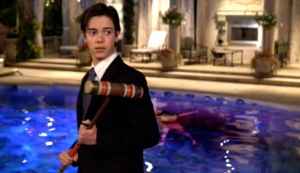“Weeds”: How TV Affects Modern Society
There are many shows that have the ability to grasp the attention of its audience right from the start, to get them hooked or simply addicted. That sounds crazy right? How can anyone have an addiction, or even worse, withdrawals, from a show? Some of the qualities you find in a show that is addictive are relatable characters, conflicts, humor and the ability to evoke emotions. These emotions can range from happy, sad, or angry. These qualities can also affect change in the viewer’s perception of life.
So what is a good example of a successful show? And how does it affect modern society? Does it have a positive effect or negative? On the contrary, how does it parallel society? These are some important questions that people need to be aware of before committing to a show.
Jenji Kohan’s Weeds came out August 2005 and had eight successful seasons, until its shocking and somewhat unsettling ending in September 2012. Throughout its production, Weeds was nominated for over twenty awards. This number is hardly shocking since Weeds was one of Showtime’s most hilarious and heartbreaking shows. In its second season, Weeds drew 5.8 million viewers, exceeding their record for the first season by 18%, and in its fifth season, the show drew 5.88 million viewers just for the season premieres at 10pm and 11pm.
So with all these awards and viewers, it is clear that the show is very successful and one to set the standards for similar TV series. But is this show all that healthy for its viewers? It’s possible that Weeds is both – an unhealthy addiction that might make the audience crave to be intertwined in the characters’ exciting lives, but at the same time, it’s just a show. But what happens if the show changes its viewer’s perception of drugs? Is it an even worse addiction then?
One way to analyze the show and how it affects and mirrors modern society is through Weeds’ individual characters and the roles they play in society.
Nancy Botwin: The Drug Dealer Soccer Mom

Being “Mom of the year” is no walk in the park. But Nancy Botwin has it all wrong. Nancy becomes a marijuana drug dealer in Agrestic, a suburb in Southern California, in order to support her two sons, Silas and Shane, after their father dies. In America, 83.3% of all single-parent families are single-mothers, and 55% of those women are either divorced, separated or widowed (Dawn).
Nancy Botwin is a clumsy, catty, young mother, who manages to get herself into sticky situations time after time. The Botwin family, season after season, show they lack the ability to learn from their past mistakes, no matter where their family migrates. Nancy is a big part of that role because she tries to maintain her business once she gets new and returning customers. Although Nancy finds herself amazing connections in the drug dealing world, her character is a complete mess and can’t seem to keep her family happily together. At one point, Nancy doesn’t have the ability to pay the electricity bills and phone bills. The Botwin family all needed to sacrifice their comfortable living luxuries in order to make it by. According to Singlemotherguide.com “single-parent families are among the poorest in the nation and as such, are extremely vulnerable to homelessness;” eight out of ten are single-mother families (Dawn). However, there is no doubt that Nancy tries her hardest to fill the role of a normal mother, pretending that everything will be okay, no matter what kind of danger she gets herself and her family into.
Furthermore, Nancy refuses to allow her older son, Silas, into the drug dealing business, but because she keeps repeatedly miscalculates the situation and needs the help, Silas eventually becomes her marijuana farmer. Who could blame Nancy? She’s desperate and Silas is free labor. But what does that show the rest of America who is watching this show, munching on popcorn and laughing their hearts out or crying their eyes out? Of course the show is not telling its audience to be just like Nancy and follow all of her examples, but it does show that every time she gets away with something, and manages to keep her family slightly together, she succeeds as a mother and that is all that matters. That in itself is what makes it acceptable. On the other hand, instead of setting an example of what a mother should be, maybe Nancy is merely portraying how mothers are in American society. No, not every mother is a drug-dealing, coffee-slurping, spying, clumsy, single parent, but perhaps that’s where society sets its standards.
Silas: An Average Teenage Rebel

This should not come as a shock, at least not initially, because every family TV series needs one of these characters. Someone most people can relate to. Well, Silas is just that, except when he’s in his late-teens, he helps his mother grow and sell marijuana. Average teen, right? Viewers could probably relate to Silas the most from the Botwin family because he thinks like an average young adult in his generation. In 2012 alone, 13.50% of teenagers between the ages of 12 to 17 smoked marijuana, and 31.50% were between the ages of 18 to 25. In 2013, 36.40% of teenagers who smoked marijuana were in 12th grade (“Marijuana”). If nearly half of young adults are involved, this statistic means smoking marijuana has become a large part of the culture and a large part of what young adults partake in during their leisure time.
Silas sets the example that smoking marijuana is an acceptable part of society while portraying other characteristics that young adults often have. For instance, Silas often gets very angry with his mother, he often tests her limits, sometimes even calls his mom, Nancy, which sets a business-like boundary between them that Nancy doesn’t know how to fix, and pretty much does as he pleases – which is often against his mothers rules. Silas’ constant frustration with Nancy’s parenting not only leads to growing conflicts in the family, but also reflects her failure at parenting. Every child is bound to be upset with his parents, whether the parenting style has a direct effect on them or not. This can be attributed to a “non-traditional” family as opposed to a “traditional” family with a working patriarch and a stay-at-home matriarch. In 2014, 58% of American families are “non-traditional,” where both the mother and the father are employed. In this case, children are not receiving the same amount of attention, causing them to act out in overcompensation, and respectively the entire family dynamic is shifted (Catalyst).
Jenji Kohan probably chose to include Silas the way he is in the show for that reason. But on the other side, the manner in which Silas allows himself to speak and act towards his mother, seeing as how she doesn’t know how to deal with it (as every parent wouldn’t), shows the younger viewers of Weeds that it can be done, and if persistent, can even become acceptable. However, this is not to say that the creators or the actors are to blame, and neither are the viewers. After all, this is a spectacular show, but it is advised to be aware of what is available for viewing and how one should intake it when he watches it.
Shane: The Wild Child

A character like Shane is one of the more difficult ones to criticize. For the majority of the show, the viewers are lead to believe that Shane is a psychopath; he most certainly possesses all the characteristics of one. However, viewers have to keep in mind that Shane is the youngest, and so he can most likely glide though any situation with his puppy-eyed look. Nonetheless, when Juda, his father, passes away, Shane is under ten years old. Therefore, Shane doesn’t know how to deal with or express his grief (nor is it addressed properly), which takes a big toll on him throughout his maturation. According to The Father-Child Relationship, Parenting Styles, and Adolescent Risk Behaviors in Intact Families,
Adolescents who reported having more positive relationships with their fathers were less likely to smoke cigarettes, drink alcohol or use marijuana compared to peers who reported having less positive relationships with their fathers. This was true taking into consideration a variety of factors: the quality of adolescents’ relationships with their mothers, parental monitoring, mothers’ and fathers’ parenting styles, fathers’ biological status, parental education, parental employment, number of children in the family, whether family received public aid, adolescents’ age, gender, race/ethnicity, and school enrollment status (“Parental Involvement and Children’s”).
Because of the absence of a father, Shane often looks up to Silas for a fatherly figure, but as he gets older and realizes that Silas does not fulfill that role, Shane begins to innately step into the shoes of a father’s role. His consistent desire to please his mother is rewarded when he is younger, but as he matures, the reward for being the one who tries to hold the family together beings to fade. Shane not only tries to involve himself in the family drug-dealing business, but also tries to protect Nancy. In the finale of season 5, “All About My Mom,” Shane shows that he is capable of protecting Nancy and Silas when he kills a woman after she threatens Nancy and her family.
The aftermath of this scene is that, as if Shane wasn’t already the “psychopath” of the family, his character from here on out begins to spiral negatively. Due to the lack of parental guidance and reprimand on Nancy’s part, society can see that Shane’s actions were acceptable. After all, he was only defending his family. The big question this situation raises is whether or not this killing was necessary. If it’s considered from a self-defense point of view, the question is not only if its necessary, but is it also okay?
Self-defense cases, once proven, are known for going unpunished. But that doesn’t mean the viewers can rightfully assume it was actually self-defense and Shane is the good guy. Although he’s no devil, Shane’s only reason to kill Pilar was based on her words. This trend had been growing at a shocking rate across the United States. As the states across America develop new “stand your ground” laws (which are laws that state someone can use deadly force to protect himself in self-defense), they are simply only, “grant[ing] people more leeway to attack and even kill someone who is threatening them.” From 2000 to 2010, there have been around 16,000 “so-called justifiable homicides,” which has doubled over the years (Palazzolo).
Shane is one of the most lovable characters in the beginning of the show. Because he is so dear to his viewers, no matter how Shane’s character spirals, his viewers remain loyal. Shane’s behavior in this scene mirrors what has been evolving in the past 11 years. Even if it is not murder, that is the excuse to get off the hook and avoid facing the consequences. What does this say about our law system and how fair it is? The direct message viewers get from the show is that if Shane was really in a self-defense situation, the law would back him up, which is what it should do. However, it also shows quite a big hole in the system. Viewers can see how easy it can be to get away with a horrible crime.
So, even if the viewers love and accept the Botwin’s, does it show that everything is okay, even if someone dies, or does it show that this is clearly a family that people should not be taking examples from? When watching a show like Weeds, it’s hard to take it seriously because of all the realistic yet fictitious scenes that take place. However, that is not to say that as viewers, society doesn’t think that any of this is possible; or even worse, that if they were in the Botwin’s situation, they would do the same, and it would be okay.
What does it all mean?
What should viewers take away from this show once their TV is off? Does the show change viewer’s perception of marijuana? Does it make the viewers curious to try drugs? Or, in that case, continue engaging in them? Although marijuana might not seem like a topic to explore seriously with all the new campaigns to legalize it, and all the data showing the world it’s not a harmful substance, Weeds definitely makes a bold statement about how this new world’s mind is developing in comparison to previous generations and years. It is possible that all of the show’s viewers already have this perception and acceptance of drugs, but more likely than not, that was not the case. Weeds shows its viewers that it’s an amazing substance that can bring you to an elite life, or it can destroy a family, a business, friends, and lives. With all of the Botwin’s failures, who would think of following their lead? But perhaps the perks of the drug are better than the downfalls. Whichever side the viewers take on the ongoing debate of legalization, there is no one clear and just side. Who’s to say which side is right or wrong? It should be up to the individual to choose what benefits his life and what road to walk down, with the law stepping aside – so long as there is no harm to those around the individual. Regardless of what the viewers believe about marijuana, Weeds was a show to remember.

Works Cited
Catalyst. Catalyst Quick Take: Working Parents. New York: Catalyst, 2012.
Dawn. “Single Mother Statistics.” Single Mother Guide. N.p., 23 Mar. 2012. Web. 25 Sept. 2014. <https://singlemotherguide.com/single-mother-statistics>.
“Marijuana.” National Institute on Drug Abuse. National Institutes of Health, Mar. 2014. Web. 25 Sept. 2014. <http://www.drugabuse.gov/drugs-abuse/marijuana>.
Palazzolo, Joe, and Rob Barry. “More Killings Called Self-Defense.” Wall Street Journal [New York] 2 Apr. 2012: n. page. Print.
“Parental Involvement and Children’s Well-Being.” Family Facts. Heritage Foundation, n.d. Web. 25 Sept. 2014. <http://www.familyfacts.org/briefs/40/parental-involvement-and-childrens-well-being>.
What do you think? Leave a comment.











This show went downhill when the killed off U-Turn and his prius. RIP Homey.
I think analyzing this show is great because it does tackle alot of issues that are not often shown on tv, like immigrants, gay marriage, etc. and fight certain stereotypes, but I do think it is important to point out and keep in mind that Weeds is shown on Showtime, which is not on basic tv or cable station, so they are able to portray more racy topics and that may be why they can challenge certain issues.
If this show didn’t show us what we had already assumed we would before we started watching it, it would be more fulfilling.
Good post. But I stopped watching Weeds after Season 3. I understand that a show needs to grow, but great, likeable characters were replaced with lame, unlikeable ones. Celia, Conrad, Helia and Doug were always my favorite characters and they were all either messed up or eliminated all together.
yeah, I agree, some of the characters became annoying towards the end, but I loved Nancy so I had to finish it!
Very interesting article! I haven’t seen Weeds, but after reading this, I’ll give it a shot. Great job!
You make good points in this article. It goes to show how much of an impact entertainment has on society.
Interesting commentary and well-written article, Nof. I believe I stopped watching Weeds after about season 3, but this article was a nice and nostalgic reminder. Thanks for posting!
Watched all the shows on netflix and became saddened to hear that its ending on season 8. Weeds was a very good show and i will miss all the characters very much.
While I thought some of the episodes in the past weren’t too amazing, I thought what Jenji Kohan did with this show was really brave. Continuously trying to change scenery to bring something new and fresh.
Thank you for your post. I love how they introduce the seemingly stereotype characters that over the episodes turn into complex and, for the most part, sympathetic struggling people – just as the characters who come into our lives. I so admire the show’s honest and iconoclastic portrayal of family secrets and awful things we think or say privately. The FCC standards be damned, I dare say it is more like us than most of us are willing to admit.
haha preach!
The finale made me cry.
I loved this show the first three seasons and could actually relate to certain plot lines from my own growing up during some of my teen years living in SoCal.
Great article! it was a really interesting read 🙂
I enjoyed your article.
You have a welcoming conversational style.
Welcome to the Artifice.
As television is more accessible through social media, netflix, and other platforms, it is more important than ever to create stories and characters that have a following. “Weeds,” is a great example of how a show can balance its repertoire with its audience through its characters, dialogue, and setting.
I enjoyed the first few seasons of the series. Unfortunately, it took the same dive many shows take nowadays: implausible scenarios, goofy characters, and unnecessary gratuitous scenes.
Although I’ve only seen a few episodes of Weeds, I found the premise intriguing. After reading this article, I may have to go check out a few more.
Nof, Nice job on the article and the way you wrote it does engage the reader as in conversation and allowing a dialouge to exploration into the characters.
Although I have never seen Weeds, your article makes me believe it is an honest show with characters that you can really connect with. I hope to watch it soon!